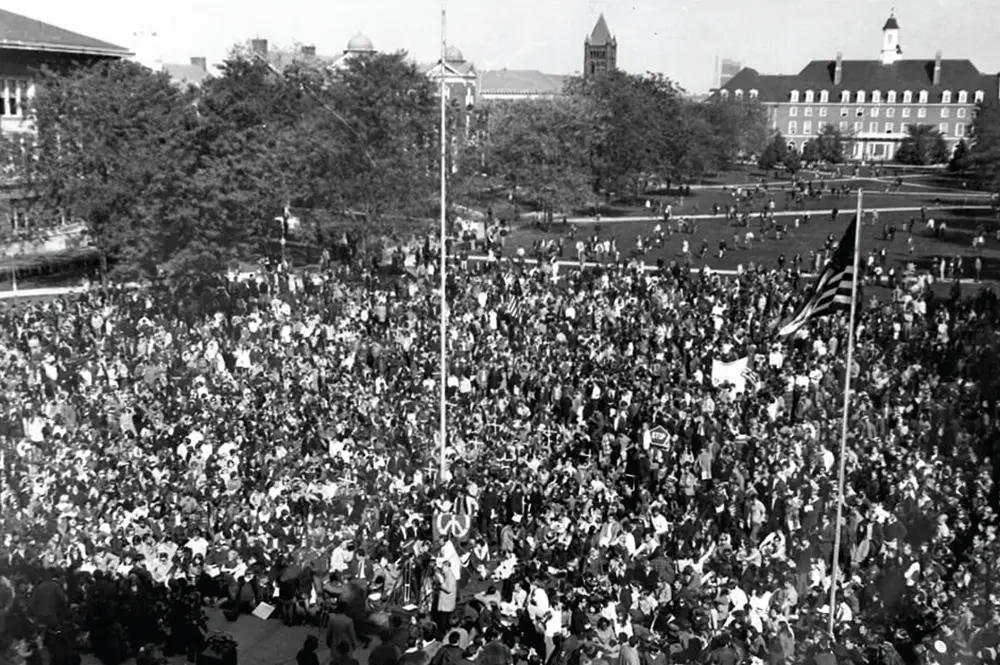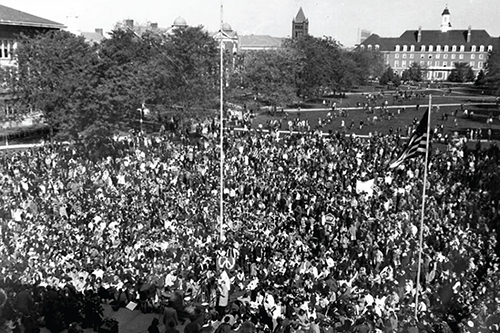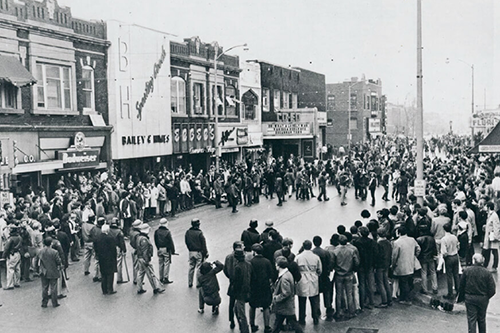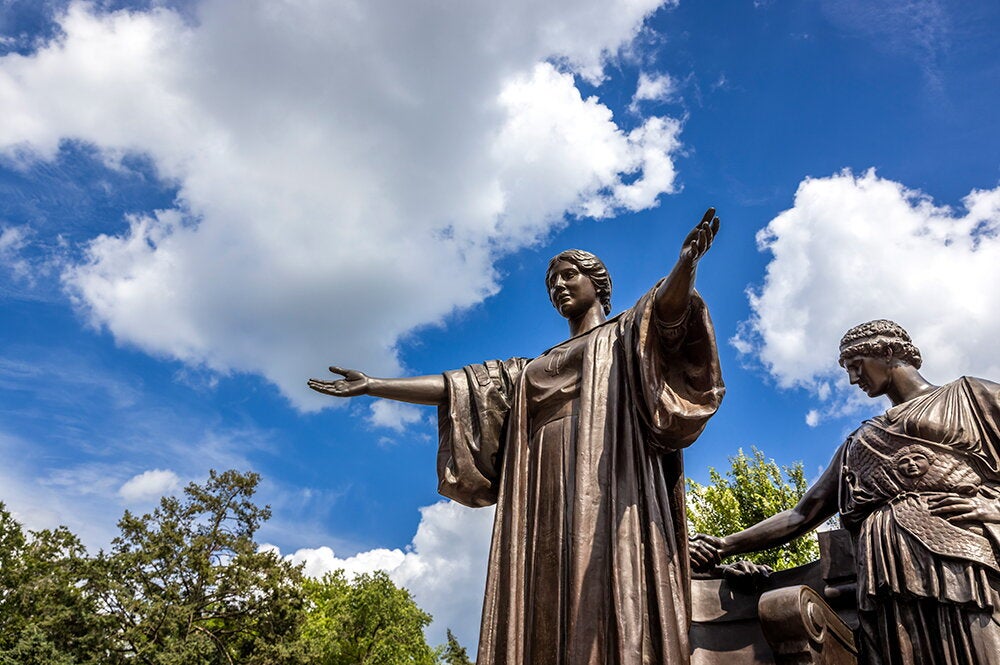

If you were to rank the people least likely to encounter an explosive device during their work shift, librarians might be near the top of your list. But on the evening of March 1, 1970, Linda Rogers (then Chapek) was approached by a man during her shift at the Altgeld Hall Library and told that there were bottles of what appeared to be gasoline in a nearby classroom. Perched atop the containers were burning cigarettes.
This was during the Vietnam War, when unrest on campuses across the nation was frequent and sometimes violent. The University of Illinois was no exception, with protests growing so large and destructive that the National Guard was summoned.
Altgeld Hall, planted prominently at the heart of campus, was the scene of some of these protests during that era. The unrest leading up to the March 1, 1970, incident were particularly tense. In January of that year, someone tossed a firebomb into the Champaign Police Department, slightly injuring an officer, and in late February, days before the incident at Altgeld Hall, someone threw a firebomb into the ROTC lounge at the Armory, though it caused no damage or injuries.
Rogers (BS, ’69, mathematics; MLS, ’70) was a graduate student working on her master’s degree in library science, and she’d acquired a job at the library. At around 10 p.m. that night Frank Povse (BS, ’70, electrical engineering and computer science), a senior looking for a quiet place to study, approached to say that there were bottles of what appeared to be gasoline in a nearby classroom.

“My first thought was that the janitors may have left some cleaning fluids,” Rogers said. She and Povse went back to the room, where they found two clear bottles filled with a pink liquid sitting on top of a desk. They didn’t look like cleaning liquids. On top of the bottles were lit cigarettes.
In a move that ultimately earned them letters of commendation from the university, Rogers and Povse approached the containers and removed the cigarettes.
“Something dropped into one of the bottles and fizzled a bit,” Rogers recalled. “We hurried out of there and called the police. The police and fire department responded. Since we had disarmed the Molotov cocktails, nothing exploded. We learned that the pink liquid was ethyl gasoline, (which is) leaded high-octane, and that there were cherry bombs stuck into the cigarettes. One of those was what was fizzling in the gas.”
The day after the incident, anti-war protests erupted against General Electric recruiting on campus (the company was then the second largest defense contractor in the country and provided weapons to the military). Rogers said she dealt with a small amount of anxiety after the incident, but she was mostly happy to have spared Altgeld Hall damage from the bombs. Povse walked her home after the incident, though the pair didn’t stay in touch after that night. Rogers went on get married and eventually worked most of her career in University of Colorado Libraries, before retiring in 2010.
Sandy Carter (BS, ’73, mathematics and computer science) was also a student at the university during this tumultuous period, and she recalled a brush with protesters inside Altgeld Hall that she said taught her the value of protecting institutions of higher learning during troubled times.
During that period, Carter recalled, campus was being heavily patrolled by the National Guard. After winter break one year, Carter said, students returned to campus to discover that the rocks around the Armory had been glued to the ground so that they could not be thrown. Troops in jeeps with barbed wire on their bumpers escorted students to their dorms in time for the 8 p.m. curfew.
One morning Carter went to Altgeld Hall for calculus. She made her way through crowds of protesters outside and found some measure of solace inside the lecture hall. It was only temporary.
“I loved math; this classroom in Altgeld Hall felt like my home turf,” Carter recalled. “But something odd caught my attention. The professor, a larger middle-aged woman in a cotton blouse and broomstick skirt, began to slowly inch her way along the wall toward the room’s exit.
"Immediately I became aware of some confusion in the hallway," Carter recalled. "The professor continued her lecture, raising her voice to overcome the increasing noise. My stomach knotted as I heard pounding and shouting approaching the hall outside our classroom.”
Carter watched as the protesters approached the room. When they tried to force their way inside, however, the professor threw her full weight against the door and held her ground even as it was buffeted by blows. The protesters eventually moved on, and Carter’s professor, her face flushed, switched the topic from calculus to the value of institutions of higher learning.
“[The professor] told us that universities should be the last places of disruption during turbulent times,” Carter said. “What would happen to our society if the bastions of new ideas, debate, and innovation were destroyed?”
Carter, who went on to work for the Army Corps of Engineers, Motorola, and other medical device and financial software companies, doesn't recall the professor's name, but she said the professor’s words and actions touched her profoundly, as Carter was the first in her immediate family to attend college. For her, attacking a building dedicated to higher learning was against everything she stood for.
“I graduated a few years later with more than a degree in math and computer science, I gained a breadth of experiences that helped me become a better thinker and analyzer of my surroundings.” Carter said. “I’m grateful to the wisdom and courage of that professor who loved and appreciated higher learning, and who left an indelible mark on one young student."
Editor's note: Altgeld Hall will soon be renovated as part of the Altgeld and Illini Hall Project.


